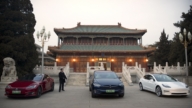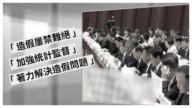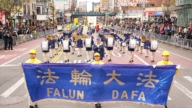【新唐人2013年01月12日讯】新年伊始,中国最火红的,莫过于《南方周末》新年特刊,遭中共广东省委宣传部官员窜改一事。在中共广东省委书记胡春华介入之后,事件出现了转圜,目前看来,风波似乎暂时告一段落。然而,英国《金融时报》却认为﹕在中华人民共和国的宪法第35条中,明确规定要保护言论自由和新闻自由,这和《南方周末》事件两者之间的矛盾,看上去荒谬和可笑。
宪法第35条规定,“中华人民共和国公民有言论、出版、结社、游行、示威的自由。”然而,中共当局始终没有落实宪法35条规定,甚至,连言论自由这个词组都被屏蔽。
《金融时报》10号刊登一篇文章,标题是“从《南方周末》事件看中国荒谬的新闻审查现状”。文章说,尽管中国共产党在宪法中保留了这一条,但一直用审查制度提醒人们,“党管媒体是不可动摇的基本原则”,这听上去的确有点荒谬。
文章引述马克思的话说,资本主义社会将会因其矛盾的重压而最终崩溃,所以让我们共同希望﹕中国的审查制度也会因为它的荒谬重压而崩溃。
《南方周末》事件在中共广东省委书记胡春华介入之后,双方达成共识,10号正常出报,取消事前审查制度,但总编辑黄灿下台。
有媒体报导,中共新政还是维稳至上,要维稳,就没有言论自由这回事。《南方周末》只是媒体人微弱的反抗,得到民间支持也很有限,当局担心事态扩大,急于安抚,如此而已。
资深媒体人高瑜表示,这是这20多年来,第一次,中国这样的主流媒体如此大规模的罢工。现在从表面上看是中共当局让步,但未来报社的言论自我审查,是由派进来的新任领导审稿、删稿、改稿,换句话说,只是换汤不换药的作法罢了。
资深媒体人高瑜:“媒体是公器,现在中国还没有私人投资的,基本上都是国家投资,做为公器,他完全是拿纳税人的钱来‘违反宪法’,实际上受损害的还是纳税人。”
时事评论员汪北稷表示,《南方周末》的胜利还言之过早,中共绝对不会在这次的事件之后,放松对人民的思想管制。
时事评论员汪北稷:“从中共从对整个国家的思想文化、媒体、通讯、微博网络,整个的管制来看,中共是越来越紧的趋势,因为中共所代表的利益集团,对这个国家、对社会、对自然环境的压榨、剥削,已经达到一种恶性循环的地步了。”
汪北稷认为,中共积压的问题越来越多,如果不严控传媒,那么官员们为非作歹的恶行被媒体揭露出来,政府就无法再欺骗民众,那人民就会起来反抗。
汪北稷:“从根本上讲的话,如果他(中共)要放松思想文化的话,他等于自取灭亡了,如果大家都有自由的发言机会,那大家只有一件事情,就是声讨中共,绝对是把这些年中共所有的罪行全部写出来,中共就灭亡了,所以中共从这件事情上来讲,是绝对不会放松媒体新闻思想舆论界的管控,只是会越来越紧。”
《金融时报》的文章最后还说,中共当局最担心的是社会的不稳定,在太多的官员看来,新闻自由等同于“动乱”,他们担心舆论自由可能导致另一次“天安门事件”。
不过,也有评论指出,除非中共做好放弃一党独裁的准备,否则言论自由一旦释出,民怨会像排山倒海般的涌出。旅居美国的中国经济社会学者何清涟撰文指出,“南周事件”是无组织力量与高度组织化政治集团的“软对抗”,它所遭遇的一切,今后会无数次在中国的社会抗争中出现。
采访/易如 编辑/黄亿美 后制/郭敬
The Constitution’s Article 35 and Censorship
At the beginning of this year, the hottest topic was
the New Year’s special edition of the Southern Weekly,
which was tampered with by a Guangdong Propaganda
Department official.
After the intervention with the Guangdong Provincial Party
Secretary, Hu Chunhua, the incident has temporarily come to an end.
However, the British Financial Times said, “Article 35
of China’s Constitution is to protect the freedom of expression and freedom of the press.
Thus, conflicts from the Southern Weekly incident look
ridiculous and laughable.
Article 35 of the Constitution stipulates, “Citizens
of the People’s Republic of China enjoy freedom of speech,
press, association, procession and demonstration."
However, the Chinese Communist Party (CCP) never
implemented article 35,and even the phrase, “freedom of speech" is shielded.
The Financial Times published an article in January
entitled, “From the Southern Weekly incident China’s ridiculous censorship can be seen."
The article says the CCP keeps article 35 in the Constitution,
but it uses censorship to remind the public that the Party media is unshakable.
This sounds indeed ridiculous.
The article also quoted Marx as saying capitalist society
will eventually collapse due to the weight of its contradictions.
Let’s hope the censorship in China will collapse
due to the weight of its contradictions.
The CCP Guangdong Provincial Party Secretary, Hu
Chunhua, reached an agreement with the Southern Weekly.
The newspaper will resume normal publication.
The censorship system before publication will be abolished.
The chief editor, Huang Can, will step down.
Some media outlets reported that the CCP focuses
on stability first.
In order to maintain stability, freedom of speech has to go.
The Southern Weekly’s protest was only the weak resistance
of media personnel, accompanied by limited civil support.
Authorities worried about the worsening of the situation,
so they were eager to appease. And that’s all.
Gao Yu, a senior media person, commented that this
is the first time in 20 years that the mainstream media in China encountered such a large-scale strike.
On the surface the CCP made concessions, but the future
self-censorship of the news agencies is up to the new leadership from outside.
That includes the review, deletion and revision of articles.
In other words, it is the same old wine, but in a new bottle.
Changes are only superficial.
Gao Yu: “Media is a public institution.
However, right now no one makes any investment in it
and it is basically a public funded instrument.
The CCP uses taxpayers’ money to violate the Constitution.
In actuality, victims are only taxpayers."
Wang Beiji, a political commentator, said that
it was too early to mention Southern weekly’s victory,
because the CCP would never give up the control of
people’s thoughts after this incident.
Wang Beiji: “From the control of communist ideology
and culture of the country as a whole, the media,
communication, and microblog network,
one can see that it is getting worse.
The CCP represents interested groups, and its exploitation
of this country, society, and natural environment has reached a vicious cycle.”
Wang Beiji believes that the CCP has accumulated
too many problems.
If it does not control the media, all sorts of evil committed
by officials will be exposed.
Thus, the government will not be able to deceive the people,
and the people will revolt.
Wang Beiji: “Fundamentally, if the CCP relaxes
its ideology and culture, it is committing suicide.
If everyone has an opportunity to speak and do just one thing,
denounce the CCP, it will collapse.
Therefore, the CCP will never let go of its control
of the media and public opinion. It will only tighten control more.”
The Financial Times concluded that the CCP fears
instability of the society the most.
Too many officials think freedom of the press
being equivalent to turmoil.
They worry that freedom of opinion could lead to
another Tiananmen Incident.
However, others commented that unless the CCP has made
preparations to give up the one-party dictatorship,
once freedom of speech is implemented, the grievances
will become a tidal wave.
He Qinglian, a China’s economic and sociology scholar
in the US, pointed out that the Southern Weekly incident
is a soft confrontation between a non-organized group
and a highly organized political group.
There will be numerous social protests like
that in the future.


























